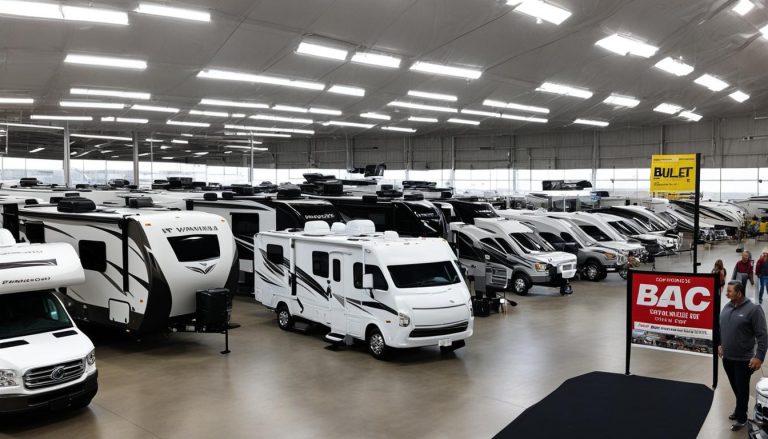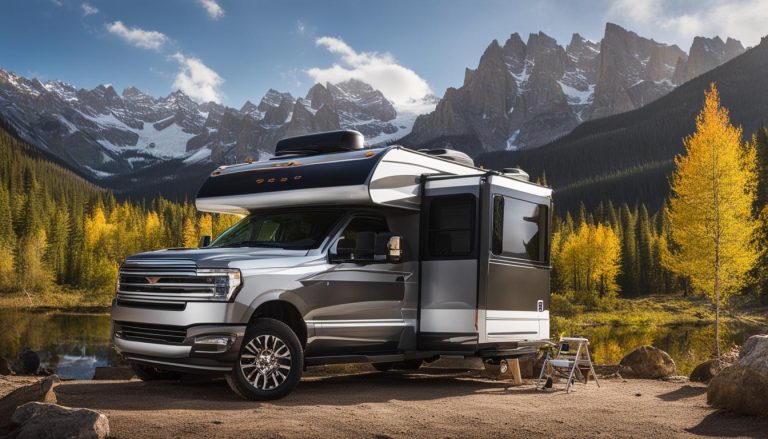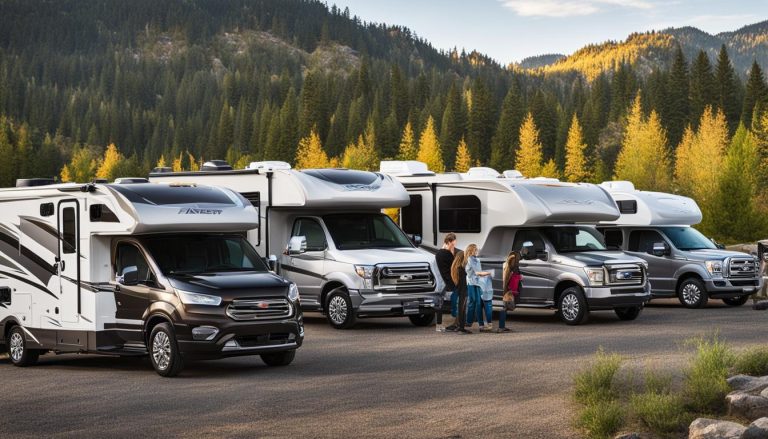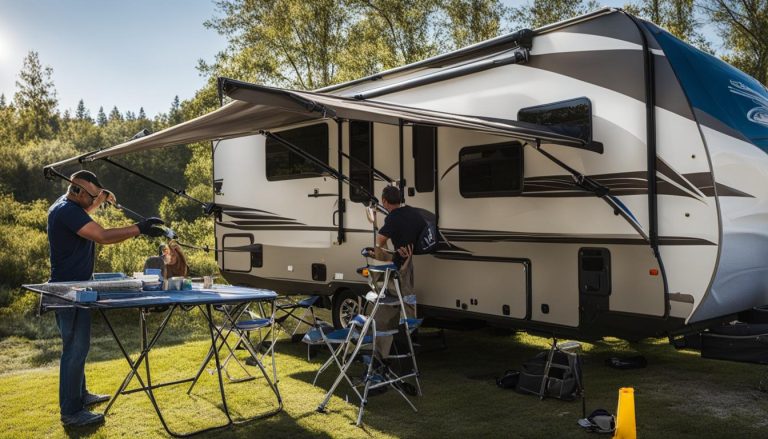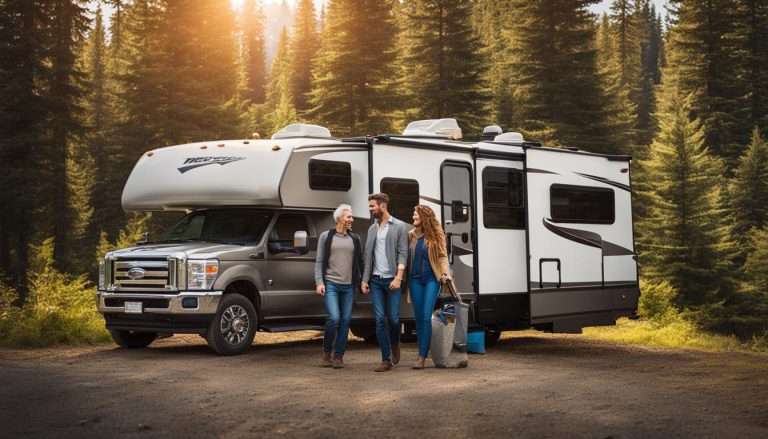Free RV Parking Spots Near You – Find Now!
gorvlifestyle.com and its partners may earn a commission if you purchase a product through one of our links
Are you searching for free RV parking spots near you? Look no further! Whether you’re planning a cross-country road trip or simply need a place to park your RV overnight, there are plenty of options available. From retail outlets to national forests, you can find convenient and cost-effective places to park your RV without breaking the bank. Let’s explore the best ways to find free RV parking near you and make your camping experience more enjoyable.
Key Takeaways:
- There are various options for finding free RV parking spots near you.
- Check with the manager or owner for permission to park overnight.
- Understanding boondocking and other free camping options can help you locate the best spots.
- National forests and Bureau of Land Management land offer scenic and secluded camping experiences.
- Other public lands, such as state parks and city parks, also provide free camping options.
Understanding Boondocking and Other Free Camping Options
When it comes to RV camping, boondocking, also known as dry camping or dispersed camping, is a popular option for adventurous travelers. Boondocking allows you to park your RV for free without any sewer, water, or electric hookups. It’s a great way to experience nature, explore remote areas, and save money on camping fees.
To fully understand the world of boondocking, it’s important to familiarize yourself with some key terms and concepts. Here are a few terms you should know:
- Black water tank: This is where the wastewater from your RV’s toilet is held.
- Blue boy: A portable container used to transport and dump black water from your RV.
- Bureau of Land Management (BLM) land: Public land managed by the BLM where you can camp for free.
- Honey wagon: A service that comes to your campsite to empty your tanks.
- Dump station: A facility where you can empty your tanks.
In addition to boondocking, there are other free camping options available to RVers. Many Walmart and other retail outlets allow overnight parking in designated spots, making them convenient places to rest and stock up on supplies. Rest stops along highways also provide short-term parking options for quick breaks.
If you’re looking for a more natural setting, state and national parks are great options. While these parks may have limited hookups, they offer beautiful scenery and a chance to immerse yourself in the great outdoors.
For those looking for unique camping experiences, consider joining programs like Harvest Hosts and Boondockers Welcome. These membership-based programs connect RVers with wineries, breweries, farms, and other locations that offer free or low-cost camping opportunities.
Take a look at the image below to get a visual representation of the different free camping options available:
Now that you have a better understanding of boondocking and other free camping options, you can start planning your next RV adventure with confidence. Whether you choose to boondock on BLM land, park at a Walmart, or explore state and national parks, free camping provides a unique and rewarding experience for RV enthusiasts.
Free Camping in National Forests
When it comes to finding a scenic and secluded camping experience, national forests are an excellent choice. Managed by the USDA Forest Service, national forests offer free camping options through dispersed camping. This means you can camp in your RV or pitch a tent in designated areas within the forest, away from the crowds and amenities of developed campgrounds.
Many national forests in the US allow for camping in RVs and tents for up to 14 days, although the stay limit may vary. It’s essential to check the local regulations and understand the specific stay limits in each area. Some national forests may have shorter stay limits or restrictions during busy seasons, so it’s a good idea to contact the nearest ranger station or make a phone call ahead of time to ensure a smooth camping experience.
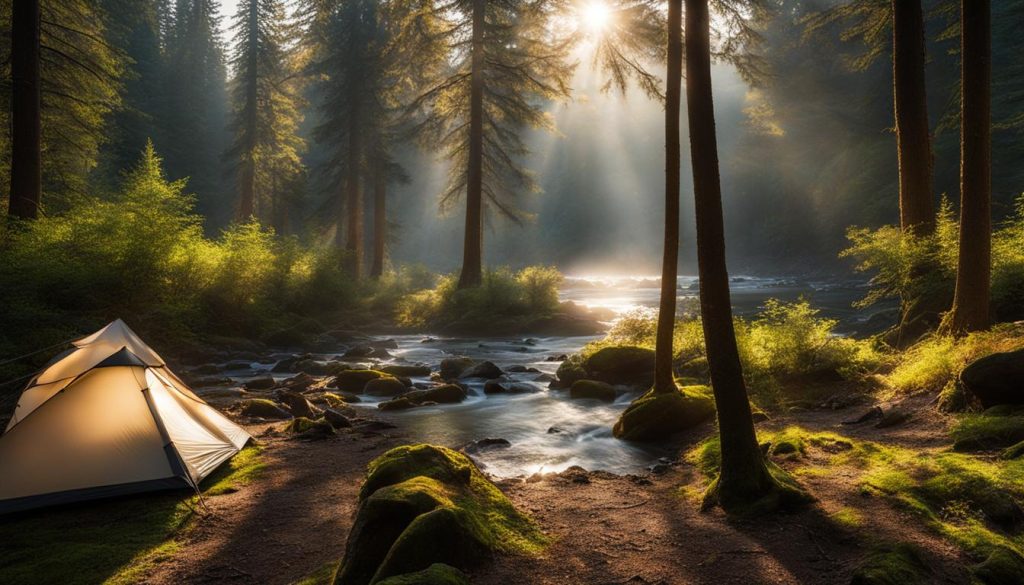
One of the advantages of camping in national forests is their proximity to national parks. As national forests often border national parks, you can enjoy the beauty of the parks during the day and retreat to the tranquility of the forest for camping at night. It’s the perfect combination of adventure and relaxation.
Whether you’re seeking an escape into nature or looking for a more budget-friendly camping experience, national forests provide an opportunity to immerse yourself in the wilderness. You can explore hiking trails, spot wildlife, and enjoy the peacefulness of remote camping.
To make the most of your camping trip in national forests, remember to pack all the necessary camping gear and supplies, including food, water, and proper waste disposal equipment. Leave no trace behind and respect the natural environment to maintain the beauty of these areas for future campers.
Free Camping on Bureau of Land Management Land
When it comes to free camping options, Bureau of Land Management (BLM) land is a hidden gem. BLM manages public lands primarily in the western US, offering the opportunity to camp for free in open desert landscapes. Whether you’re traveling in an RV, van, or even tent, BLM land provides diverse camping experiences.
On BLM land, campers can enjoy a 30-day stay limit, although it’s important to note that this limit may vary depending on the specific area. This extended stay duration allows for a more immersive camping experience and gives you ample time to explore and appreciate the natural beauty surrounding you.
However, it’s essential to be aware that BLM land is also used for resource extraction and grazing. This means that while you’re enjoying the stunning landscapes and solitude, you may encounter activities such as livestock grazing or resource extraction operations. It’s crucial to respect these activities and follow any posted guidelines or restrictions.
To ensure a successful camping trip on BLM land, conducting research ahead of time is key. Each specific location may have different regulations, so it’s important to familiarize yourself with the rules and guidelines of the area you plan to camp in. This will help you plan accordingly and make the most of your time spent on BLM land.
Benefits of Camping on BLM Land:
- Access to pristine open desert landscapes
- Extended 30-day stay limit for a more immersive camping experience
- Freedom to camp in RVs, vans, or tents
- Opportunity to explore diverse uses of BLM land
Considerations for Camping on BLM Land:
- Potential encounters with livestock or resource extraction activities
- Researching specific regulations and guidelines for each location
- Respecting and following any posted guidelines or restrictions
“Camping on BLM land offers a unique opportunity to connect with nature and experience the vast beauty of the open desert. Just remember to be mindful of the various activities taking place and always leave no trace.” – Jane Doe, avid camper
Free Camping on Other Public Lands
In addition to national forests and BLM land, there are several other types of public lands in the US and Canada that offer free camping opportunities. These include state parks, city parks, county parks, water management districts, trust lands, conservation areas, and smaller federal agencies such as the Army Corps of Engineers and the Bureau of Reclamation. Each of these public land options provides its own unique camping experience with different rules, stay limits, access, and amenities.
If you prefer a more developed camping experience, state parks, city parks, and county parks often offer designated camping areas with various amenities such as picnic tables, fire pits, and restroom facilities. These parks are typically well maintained and provide a range of recreational activities for you to enjoy. Some even offer access to lakes, rivers, or hiking trails, allowing you to fully immerse yourself in nature.
Water management districts and trust lands can also provide free camping opportunities. These lands are typically managed for resource conservation and can offer a more remote and peaceful camping experience. Although these areas may have fewer amenities, they often allow for a closer connection with nature and the opportunity to explore untouched landscapes.
If you’re looking for unique camping experiences, consider camping on Army Corps of Engineers or Bureau of Reclamation lands. These federal agencies manage a variety of public lands, including reservoirs, river systems, and irrigation projects. Camping on these lands may provide access to stunning waterfront views and recreational activities such as fishing, boating, or swimming.
To ensure the best camping experience, it’s important to research and understand the specific rules and regulations of each public land area. Check for any stay limits, reservation requirements, or permit fees that may apply. Reading reviews from other campers and reaching out to the managing agencies can also provide valuable insights into the accessibility, amenities, and overall suitability of these free camping options.
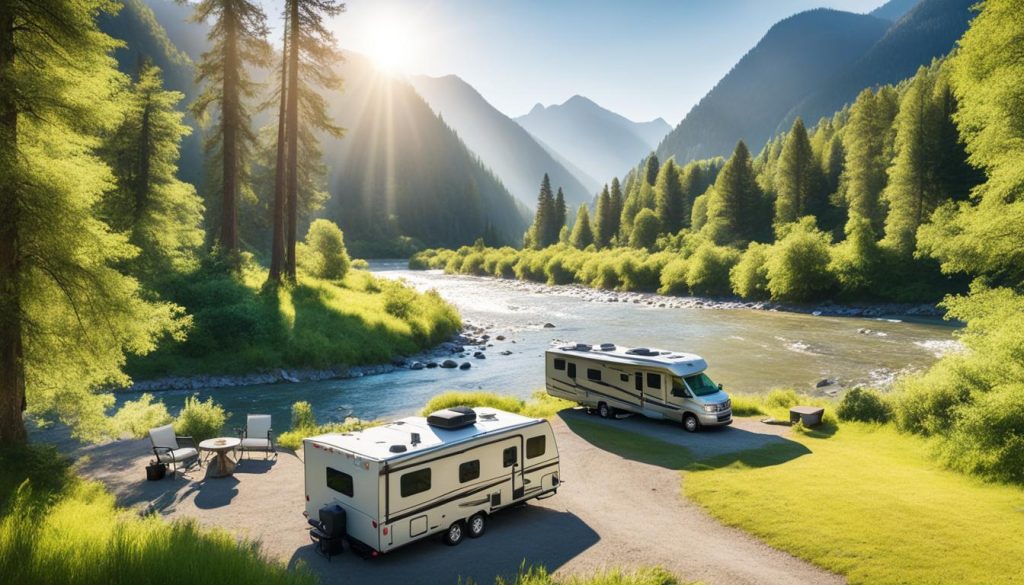
| Public Land Type | Rules and Stay Limits | Access | Amenities |
|---|---|---|---|
| State Parks | Varies by park; often limited stay limits | Well-maintained roads and trails; accessible by car | Picnic tables, fire pits, restrooms, some may have electric and water hookups |
| City Parks | Varies by park; often limited stay limits | Easy access from urban areas | Picnic areas, playgrounds, restroom facilities |
| County Parks | Varies by park; often limited stay limits | Accessible by car; located in suburban or rural areas | BBQ grills, picnic shelters, hiking trails |
| Water Management Districts | Varies by district; often remote camping areas with longer stay limits | May require off-road access; rural or wilderness locations | Limited amenities; may have pit toilets or no facilities |
| Trust Lands | Varies by trust; often remote camping areas with longer stay limits | May require off-road access; wilderness or natural areas | Limited to no amenities; primitive camping |
| Army Corps of Engineers Lands | Varies by project; often limited stay limits | Accessible by car; located near reservoirs or waterways | Boat ramps, fishing piers, picnic areas, some sites with electric hookups |
| Bureau of Reclamation Lands | Varies by project; often limited stay limits | Accessible by car; located near reservoirs or waterways | Boat ramps, fishing access, picnic areas, some sites with electric hookups |
Overnight Parking Options
When it comes to finding a convenient place to park your RV or van overnight, developed areas such as truck stops, Walmart, and rest areas can offer viable options. These locations provide designated parking areas that allow for overnight stays, making them particularly suitable for travelers seeking a safe and convenient place to rest.
One of the advantages of overnight parking in developed areas is the availability of amenities. Many truck stops, for example, offer facilities like fuel stations, convenience stores, and even showers, providing added convenience during your journey. Walmart stores also often allow overnight parking, making it convenient for RVers to restock supplies or take care of any last-minute shopping needs.
Rest areas, typically located along highways, are another popular choice for overnight parking. These areas are specifically designed to provide a safe place for motorists to take a break, with dedicated parking spaces for larger vehicles like RVs and vans.
It’s important to keep in mind that rules and limitations for overnight parking can vary from location to location. Some places may have specific restrictions on the duration of parking or may require you to register with the management before staying overnight. Always make sure to read any posted signage and follow the rules to ensure a hassle-free experience.
Benefits of Overnight Parking:
- Convenient and accessible locations
- Amenities available at some locations
- Safe and secure parking areas
Considerations for Overnight Parking:
- Rules and limitations vary by location
- Not suitable for tent camping
- May require permission from the manager
Remember to always do your research and plan ahead when looking for an overnight parking spot. Checking online resources, RV forums, or apps dedicated to finding overnight parking can also provide valuable information and reviews from fellow travelers. By being prepared and informed, you can find a suitable and convenient place to park your RV or van overnight during your travels.
Benefits and Considerations of Free Camping
Free camping offers several benefits that make it an attractive option for outdoor enthusiasts. One of the main advantages is the opportunity to camp without amenities. Unlike traditional campgrounds, free camping allows you to disconnect from modern conveniences and experience a simpler way of life. This can be especially appealing for those seeking solitude and a break from the hustle and bustle of everyday routine.
Another benefit of free camping is the chance to immerse yourself in remote locations. Whether it’s a secluded beach, a hidden forest, or a breathtaking mountain range, free camping provides the opportunity to connect with nature in its purest form. These remote camping spots often offer stunning views, peaceful surroundings, and a sense of serenity that is hard to find elsewhere.
Perhaps one of the biggest advantages of free camping is its affordability. Camping without the need for expensive amenities or campground fees can significantly reduce your travel expenses, making it a budget-friendly option for those looking to explore the great outdoors without breaking the bank. By saving money on accommodation costs, you can allocate your resources to other experiences, such as hiking, fishing, or simply enjoying the beauty of nature.
While free camping offers numerous benefits, it’s important to consider the trade-offs. One major drawback is the lack of amenities such as water, sewer, and electric hookups. This means you’ll need to plan and prepare accordingly, bringing your own water, managing waste responsibly, and relying on alternative power sources if needed. Additionally, free camping spots are often located in more remote or less desirable areas, which may be noisier or less convenient compared to established campgrounds.
Furthermore, some free camping options may have limited stay limits, requiring campers to move frequently. This can disrupt your camping experience and require additional logistics and planning. It’s also important to note that certain free camping sites may require specific equipment or permits, so research and preparation are essential to ensure a smooth and enjoyable camping trip.
In conclusion, free camping offers numerous benefits, including the chance to camp without amenities, enjoy solitude in remote locations, and travel on a budget. However, it’s crucial to consider the trade-offs, such as the lack of amenities, potential noise or inconvenience, limited stay limits, and the need for extra preparation. By weighing these factors, you can make an informed decision and enjoy the rewards of free camping while minimizing any potential challenges.
FAQ
Where can I park my RV for free near me?
There are several options for free RV parking near you, including Walmart and other retail outlets, rest stops, state and national parks, national forests, Bureau of Land Management (BLM) land, and other public lands. It’s important to check with the manager or owner of the parking location to ensure you have permission to park overnight.
What is boondocking?
Boondocking, also known as dry camping or dispersed camping, refers to parking your RV for free without any sewer, water, or electric hookups. It allows you to camp off-grid and enjoy more remote locations. Just be sure to have the necessary equipment and knowledge to handle black water waste and empty your tanks at a dump station.
What are some free camping options besides boondocking?
In addition to boondocking, you can find free camping options at Walmart or other retail outlets, designated RV spots at rest stops, and state and national parks. There are also membership-based programs like Harvest Hosts and Boondockers Welcome that offer free or low-cost camping at wineries, breweries, and farms.
Can I camp for free in national forests?
Yes, national forests offer free camping options through dispersed camping. Many national forests allow camping in RVs and tents for up to 14 days, although the stay limit may vary. These areas provide a secluded and scenic camping experience, away from the amenities of developed campgrounds.
What is BLM land and can I camp for free there?
The Bureau of Land Management (BLM) manages public lands primarily in the western US, including open desert landscapes. BLM land offers free camping options with a stay limit of usually 30 days, although it can vary. These areas are suitable for RVs, vans, and sometimes tents, depending on the location. However, be aware that you may encounter livestock or resource extraction activities on BLM land.
Are there other types of public lands where I can camp for free?
Yes, besides national forests and BLM land, there are other public lands in the US and Canada that offer free camping options. These include state parks, city parks, county parks, water management districts, trust lands, conservation areas, and smaller federal agencies like the Army Corps of Engineers and the Bureau of Reclamation. The rules, stay limits, and amenities vary depending on the specific location.
What are some overnight parking options for RVs?
RVs can overnight park in developed areas such as truck stops, Walmart, rest areas, and town parking lots. These options are best suited for RVs and vans and are not typically suitable for tent camping. However, rules and limitations for overnight parking can vary widely, so it’s important to read posted signage, ask permission if it is a business, and do research to find a safe and appropriate overnight parking spot.
What are the benefits and considerations of free camping?
Free camping offers benefits such as camping without amenities, enjoying solitude in remote locations, and being a budget-friendly option. However, it’s important to note that free camping may lack amenities like water, sewer, and electric hookups, and can sometimes be located in noisy or less desirable areas. Additionally, some free camping options may have limited stay limits or require extra equipment and preparation.

